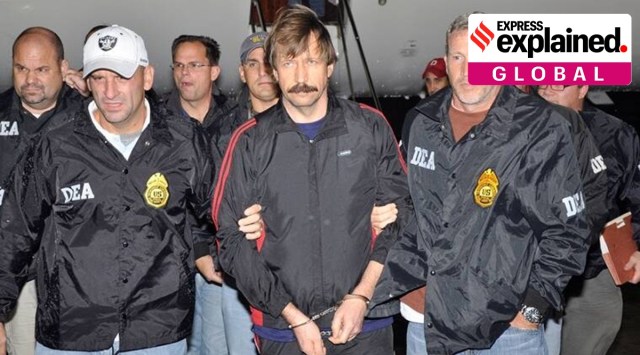Explained: Who is Victor Bout, the Russian arms dealer the US may swap for Brittney Griner?
Notorious for fuelling violence across the globe with his weapon supplies, Viktor Bout was for long considered a key figure in the shadowy world of illicit arms smuggling.
 Suspected Russian arms dealer Viktor Bout (Centre) being escorted by Drug Enforcement Administration (DEA) officers after arriving at Westchester County Airport in White Plains, New York, on November 16, 2010. (Reuters)
Suspected Russian arms dealer Viktor Bout (Centre) being escorted by Drug Enforcement Administration (DEA) officers after arriving at Westchester County Airport in White Plains, New York, on November 16, 2010. (Reuters)The United States has offered a prisoner swap deal to Russia, in order to free WNBA star Brittney Griner and a former US Marine Paul Whelam. The US claims that both Griner and Whelam have been wrongfully detained in Russia. While there is no official confirmation on what is being offered in return, news agency reports citing sources familiar with the matter claim that the US is ready to trade Russian arms dealer Viktor Bout, known as the ‘merchant of death’ and currently serving a 25-year jail sentence in America.
Who is Viktor Bout?
Notorious for fuelling violence across the globe with his weapon supplies, Viktor Bout was for long considered a key figure in the shadowy world of illicit arms smuggling.
Before his arrest in 2008, Bout’s operational network extended to Afghanistan, Pakistan, Iraq, Sudan, Angola, Congo, Liberia, the Philippines, Rwanda and Sierra Leone. His exploits earned him the moniker ‘merchant of death’, and even inspired the character played by actor Nicolas Cage in Hollywood film ‘Lord of War’.
A former Soviet air force officer with a supposed military intelligence background, Bout acquired a private fleet of old yet highly sturdy Antonov, Ilyushin and Yakovlev cargo planes that were up for grabs after the fall of the Soviet Union. According to one account, his new start-up took off with help from the GRU, the Russian military intelligence service, which gave him his first three planes.
His air freight operations soon evolved into a business of channeling weapons into the world’s most dangerous conflict zones. As he operated with impunity, the world at large remained oblivious of his activities until after 9/11, noted a 2007 book on him titled ‘Merchant of Death’.
It said: “Secure in his anonymity, the phantom Russian had amassed the largest private fleet of vintage Soviet cargo planes in the world. His freighters plied ceaseless circuits across Africa and Asia, flying out of an airport in the obscure dune-swept Persian Gulf emirate of Sharjah and in smaller hubs from Belgium to South Africa. Bout himself turned up regularly in the world’s most perilous killing zones, hobnobbing with dictators and warlords before returning to the safety of sumptuous homes in Russia, Belgium, South Africa, and the United Arab Emirates.”
In 2005, the US Department of Treasury said that Bout had “the capacity to transport tanks, helicopters and weapons by the tons to virtually any point in the world”. Not only would he arm different sides in the same conflict, Bout also used his network to fly UN peacekeepers to Somalia, ship World Food Program aid to Democratic Republic of Congo – trips that showed his ability to integrate his “operations with governments and global organizations”.
He was also accused of conducting money laundering and arms trafficking for the Taliban and Al Qaeda, and had a list of clients that included Libya’s Muammar Gaddafi.
 Paul Whelan (left) and Brittney Griner (right).
Paul Whelan (left) and Brittney Griner (right).
How was he captured?
In 2006, the US government froze Bout’s assets (he had 12 shell companies incorporated in the US out of his network of 30) and prohibited transactions between him and American nationals/entities. But he would not be arrested until the next two years. The sanctions, a European intelligence official told The Guardian before his arrest, were only to “keep him in line” as “everyone needs him at some point, or might (need him)”. But that changed in 2008.
US Drug Enforcement Agency agents lured into a trap laid in Thailand where they posed as Colombia’s FARC rebels, and Bout agreed to sell them arms. The deal, the US Department of Justice said came “with the specific understanding that the weapons were to be used to attack US helicopters in Colombia”. The Revolutionary Armed Forces of Columbia or the FARC is a US-designated terror outfit. After his arrest in March 2008, Bout was extradited to the US in November 2010.
In 2012, he was sentenced to 25 years in jail after being convicted for “conspiring to sell millions of dollars worth of weapons, including hundreds of surface-to-air missiles and over 20,000 AK-47s” to the FARC rebels.
The deal for which he was arrested, the Justice Department said in 2012, had on offer arming the Colombian rebels with 10 million rounds of ammunition, five tons of C-4 plastic explosives, “ultralight” airplanes outfitted with grenade launchers, and unmanned aerial vehicles.
Why would Russia want him back?
Despite being convicted, Bout has maintained that he is innocent and a legitimate businessman. For Russia, his case is a human rights issue and would help it bolster the narrative of “persecution” of innocent Russian citizens by the West.
As a mark of support last year, a four-day exhibition of his prison paintings–selected by his wife–was held at Russia’s Civic Chamber building in Moscow. The Chamber is mandated to protect the rights of citizens during shaping and implementation of state policies.
His defence lawyer, according to an Associated Press report, claims that Bout was vindictively targeted by the US after it was revealed that one of his companies had helped fly supplies to American military contractors during the Iraq war despite UN sanctions being in force against him. Bout himself has often reiterated that the case against him is political.



- 01
- 02
- 03
- 04
- 05



































